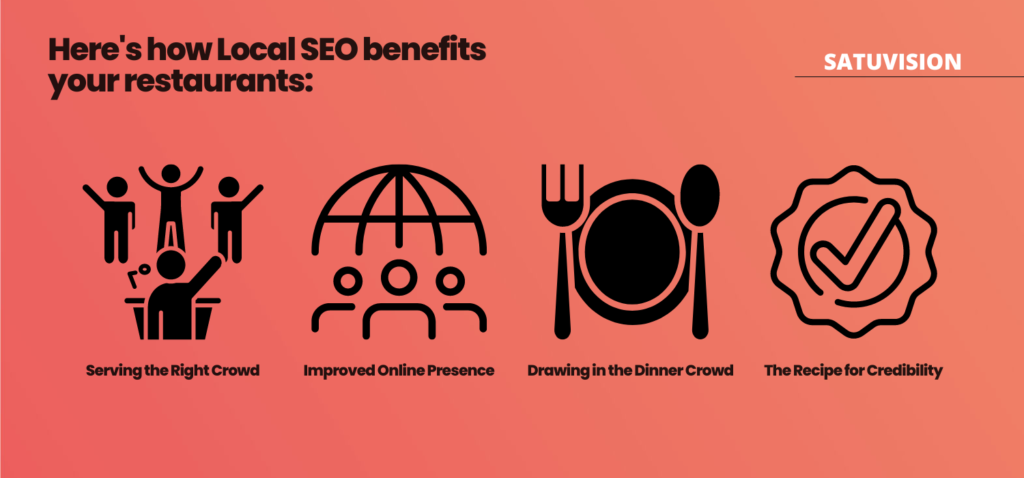Local SEO for Restaurants: How to Attract Local Customer to Your Business
This is the era where quick online research can significantly influence dining decisions, putting your restaurant to show up at the top of the list isn’t just a good thing—it’s essential nowadays. Local SEO isn’t just another buzzword; it’s the best move in the crowded and competitive restaurant industry.
Imagine you’re the owner of “Mamma Mia,” a cozy Italian pizzeria in the bustling streets of Denpasar, Bali. Your pizza might be the best of the best in town, but if no one can find you, you will not sell a lot of them. That’s where local SEO swings into action.
With a solid local SEO game, your pizzeria doesn’t just show up; it also shows mouth-watering photos and great and detailed reviews. Suddenly, you’re not just a choice; you’re the choice.
So, let’s talk about local SEO for restaurants, we’ll cut through the noise and lay out clear, actionable strategies to boost your online visibility.
Table of Contents
Understanding What Local SEO is for Restaurant Businesses
Local SEO helps restaurants become more visible in local search results, which is essential to attract more customers. A report shows that most people (68%) have tried a new restaurant because of good online reviews. Also, almost half (45%) regularly check reviews before picking a restaurant. (TouchBistro: How Diners Choose Restaurants: Report)
67% of millennials are using reviews as the main criteria to choose a new dining place. Thus, Google reviews are by far the most consulted, making Google the main platform to consider.
By wielding Local SEO well, you’re not just visible; you’re drawing in the crowd with positive vibes and good reputations.
Boost your Restaurant’s Growth: Benefit of Local SEO
Now you know how local SEO can help to enhance your local visibility and boost more conversions.
But it’s not just about getting your name out there, it’s about putting your restaurant into the local community for the long haul. Here’s how Local SEO benefits your restaurants:

- Serving the Right Crowd: Fun fact: Most local keywords have transactional & commercial intention, meaning the buying intent is high! By optimizing relevant localized keywords and sentences, restaurants can attract visitors who are actively seeking specific cuisines or services, thus increasing the likelihood of conversions.
- Improved Online Presence: Local SEO strategies not only enhance a restaurant’s online visibility but also contribute to higher search engine rankings. This not only makes your restaurant more noticeable but also makes your brand trustable in online communities.
- Drawing in the Dinner Crowd: With Local SEO, your restaurant doesn’t just show up in searches; it stands out in local map listings and “near me” quests. It’s like having a neon sign that guides food lovers right to your doorstep, increasing foot traffic and, subsequently, reservations.
- The Recipe for Credibility: High rankings in search engines are the modern-day Michelin stars. They signal to potential customers that your restaurant is not just a choice, but a choice. Achieving this through Local SEO not only boosts your reputation with credibility but also sets up your status as a local choice.
Strategies for Optimizing Local SEO for Restaurant
Local Keywords Planning
Local keyword planning is a fundamental aspect of optimizing your business’s online presence within a specific geographic area.
What exactly is keyword planning?
Keyword planning involves identifying the specific search terms you want your restaurant’s website to rank for.
Simply say it’s a strategy in selecting and targeting relevant keywords that hungry locals use in their search bars when their stomachs rumble for what you’re serving.
You can start by identifying the terms, which can range from single words (like “pizzeria restaurant“) to longer phrases (such as “best pizzeria restaurant in Denpasar“).
Besides that, you could also utilize a keyword planning tool. They help you discover variations of your initial keywords, showing you what people really search for.
Here are some recommended keyword planning tools:
When conducting keyword research, categorize your targets into three main types of keywords: high-intent broad restaurant terms, niche keywords, and branded keywords.
- High-intent broad restaurant terms: These encompass broad yet valuable keywords like “pizza restaurant in Denpasar” or “best pizza restaurant in Denpasar.”
- Niche keywords: These are specific keywords related to your restaurant’s offerings, like “Pizza promo deals.”
- Branded keywords: Optimize for your restaurant’s name and associated keywords. Ensure that your restaurant’s name appears prominently in search results.
Google My Business Optimization
Your Google My Business (GMB) profile is often the first touch point connection point between your restaurant and potential customers.
It’s the first thing your customers see, the first impression they receive, and the first step in deciding whether your place is worth their time (and appetite).
So, let’s make sure you make the most out of your GMB by following these steps:
- Claim and Verify Your Business: First things first, claim your territory. Ensure your restaurant is listed on GMB, and verify your listing to show you’re the real owner of your business.
- Update Your Profile Regularly: Keep your opening hours, contact info, and menu items as fresh as your ingredients. Regular updates ensure that when customers check you out online, they’re getting the real information, not last season’s hours.
- Add Photos and Virtual Tours: Upload high-quality, appetizing photos of your dishes and cozy decor. Consider adding a virtual tour to really set the scene. It’s like giving potential customers a taste test with their eyes.
Creating Local Content
Crafting content that resonates with your local community is like preparing a dish that perfectly suits the local palate. It’s not just about being visible; it’s about creating a connection that brings customers through your restaurant door.
Write blog posts about local events or popular ingredients in your area (that are related with your business of course) or highlight the use of local products in your dishes to strengthen your connection with the community.
These posts are your chance to show you’re not just in the community—you’re part of it.
Platforms like Facebook and Instagram are your digital weapon to amplifying your voice in the local community. Share those blog posts, sprinkle in appealing photos of your dishes, and don’t forget to engage in the local chatter.
FREE RESOURCES: Social Media Plan Template for Restaurant and Cafe
Encourage & Respond to Online Reviews
In the online culinary world, reviews are the main factor in your restaurant’s reputation. It’s important to respond to both good and bad reviews to let customers know you care about what they think. Answering comments shows that you value their opinions.
Here are a few tips you might consider: ask happy customers to leave reviews and maybe offer a small incentive like a discount for their next visit. This way, you can encourage more people to share their experiences, making your restaurant stand out online.
Mobile Optimization
The chance of attracting hungry customers from their smartphones is huge. People are connected to their phones almost 24/24. This is not just a saying, Google even uses mobile-first indexing as its ranking factor, what does that mean?
The mobile version of your website is an important factor in Google’s ranking, as many people are using phones to search for a restaurant, you need to provide the best mobile experience..
Consider the mobile user’s journey. When hungry customers search for dining options on their smartphones, they seek quick, accessible information.
Your restaurant’s website must be loaded fast, display correctly on mobile sizes, and provide essential details upfront—such as menus, opening hours, and location. But how does one achieve this? The answer lies in responsive mobile web design, fast loading times, and clear, concise content.
How to Monitor Your SEO Efforts
Ensuring your website remains optimized for search engines involves a few key practices:
- Utilize Analytics Tools: Google Analytics is essential for tracking website traffic and understanding user behavior. It provides insights into what’s working and what’s not, allowing for data-driven adjustments.
- Keep Up with SEO Trends: The digital landscape is constantly evolving. Staying informed about the latest SEO strategies ensures your site remains competitive and visible.
- Conduct Regular SEO Audits: Periodic reviews of your SEO strategy help identify improvement areas, ensuring your website consistently ranks well in search results.
Essential Tools for Your SEO Monitoring:
- Google Analytics: Offers insights into website traffic and user engagement.
- Google Search Console: Helps understand your site’s performance in Google search and identifies issues to fix.
- SEMrush: Provides keyword tracking and competitive analysis.
- Ahrefs: Useful for tracking keywords and analyzing SEO health.
- Moz: Offers tools for measuring domain authority and on-page optimization.
Using these tools regularly can help you refine your SEO strategy, track performance, and adapt to changes in search algorithms.
READ MORE: How Local Digital Advertising Works & The Benefits in 2024 for Your Local Business
Conclusion: Achieve Success with Local SEO for Restaurants
An effective local SEO can set your restaurant apart. By optimizing your online presence, engaging with your local community, and staying proactive in your SEO strategies, your restaurant can achieve greater visibility and attract more diners. Embrace these techniques, and watch your restaurant thrive in the bustling local food scene.
Frequently Asked Questions
Optimizing your restaurant’s online presence through search engine optimization (SEO) makes it simpler for customers to discover information and order more food from you. SEO employs various methods, including incorporating relevant keywords in your online content and listing your site in local directories, to enhance the visibility of your restaurant on the internet.
Incorporating local keywords can enhance your presence in local search results, making it simpler for potential customers to locate your business when searching for products or services you provide. This heightened visibility can result in increased website traffic and, ultimately, more sales and revenue for your business.





